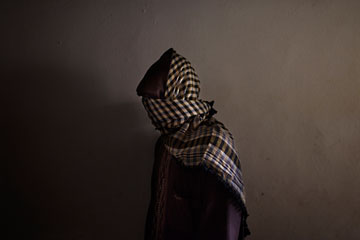
A member of Boko Haram, in a suburb of Kano, Feb. 12 2012.
(2 of 3)
But it's not just the hospital workers of Maiduguri who are suffering at the hands of the U.S.-backed Nigerian security forces. Rights groups and witnesses say the military and police regularly abuse innocent civilians. And on May 17, Secretary of State John Kerry said the U.S. defended Nigeria's right to defend itself against terrorists, but he added, "I have raised the issue of human rights with the government, with the Foreign Minister. We have talked directly about the imperative of Nigerian troops' adhering to the highest standards and not themselves engaging in atrocities or in human-rights violations. That is critical. One person's atrocity does not excuse another's."
Origins of the Threat
The man with the $7 million American price on his head and numerous atrocities to his name is Abubakar Shekau, Boko Haram's ruthless and ambitious leader. Bearded and wearing fatigues and a headscarf, he appeared in a video released in May, declaring, "We will never abandon this jihad until death ... Our goal in this jihad is the establishment of an Islamic state or martyrdom." In July, Shekau released another video, this time expressing his support for the attack that month on a northern school where at least 29 students and one teacher were burned alive after gunmen attacked the building. Shekau insisted his fighters targeted non-Islamic schools and their teachers, not children.
If Shekau's extremism is now plain to see, the movement he leads has been a long time in the making. Boko Haram's founder was a cleric named Mohammed Yusuf who, as a young firebrand in 2001, began preaching in Maiduguri against the government's ills, such as the prevalence of corruption, the lack of adequate employment and education, and the high rates of poverty among the northern population. He railed against what he saw as Western-style education, which he said led to those ills, and said Nigeria's system of government needed to be replaced by a strict form of Islamic law. Yusuf and like-minded clerics recruited followers — not only very young unemployed men, but also sons of prominent families and graduates of the University of Maiduguri, who burned their diplomas in solidarity. Most imams and Islamic scholars in Maiduguri openly disagreed with Yusuf's teachings.
Local media started to call the group Boko Haram, which translates as "Western education is forbidden" in the regional language Hausa. But the name the group gave itself was Jama'atu Ahl as-Sunnah il-Da'awati wal-Jihad (which means, in Arabic, People Committed to the Propagation of the Prophet's Teachings and Jihad). They donned turbans and carried weapons on their shoulders as they rode motorcycles through the sandy streets of Maiduguri. An ancient center of Islamic learning and trade choked by dry heat, the city is a sprawl of low-level buildings and was home to a million people before the conflict. In April 2009, several Boko Haram members were involved in a lethal car accident. When the group gathered at the city cemetery to bury the dead men, government troops opened fire on them and killed several of the Islamists. Yusuf quickly declared war against the government in revenge.
In July of that year, his group bombed and set fire to government buildings in the city. Four days of battle ensued, during which more than 800 people were killed and thousands more fled their homes. Yusuf was taken into custody and soon after was shot dead. (Police say he was killed while trying to escape; Boko Haram maintains that he was summarily executed.) With Shekau as the group's new leader, Boko Haram intensified its campaign of violence: it set fire to police stations and began a long streak of assassinating civil service workers and elected officials. It robbed banks, blew up cell-phone towers and bombed markets and dozens of churches in central and northern Nigeria. Militants shot guests at weddings and funerals. Over 3,000 people have died in the conflict.
At the sedate campus of the University of Maiduguri, some female students walk around wearing abayas and hijabs, others in knee-length skirts with uncovered hair. Mohammed Gujbawu, a balding professor with wire-rimmed glasses, received a threatening text from someone claiming to be Boko Haram late last year, telling him to advise his students not to wear clothes that exposed themselves. The text was traced back to the student hostels. "Lecturers now are very careful in class and do not mention anything related to Boko Haram or terrorism because they're here," Gujbawu says.
Fighting Fire With Fire
Faced with the kind of brutality Shekau espouses, the violence his group is capable of and the fear the militants create in the general population, Nigerians broadly support their government's decision to launch the offensive. But in a country that often suffers from tension between its mostly Muslim north and predominantly Christian south, the campaign has often seemed oblivious to the need to win over the hearts and minds of the Muslim population in the north.
